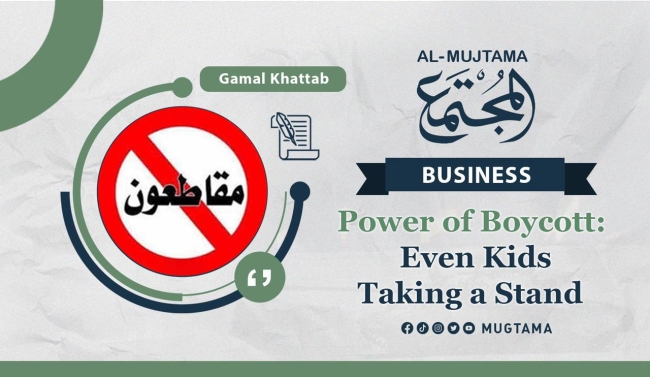The Power of Boycott: Even Kids Taking a Stand Featured
In a store in Cairo, a young child refused to buy a certain brand of french fries. He told his father, "No, father, this is a boycott! I will choose another kind." This child is not alone. Many people in Arab and Islamic countries are participating in boycott campaigns.
Why Are People Boycotting?
One university student, Kawthar Adaunsar, decided to boycott fast food restaurants after learning that certain brands supported the Israeli occupation army. She now prefers local alternatives.
Boycott Efforts in Egypt
In Egypt, activists have launched websites to inform people about boycotted products and raise consumer awareness. They also share information about alternative products. While there is no official data on the size of the boycott, sales at McDonald's in Egypt reportedly fell by at least 70% in October and November.
Choosing Local Alternatives
The boycott has affected various products and companies, including soft drinks, food, fast food restaurants, cafes, clothing, and commercial chains. Sometimes, people boycott a company simply because of its nationality, even if it doesn't support the Israeli occupation army. Despite declining quality, local products have become more popular.
The Impact of Boycotts
The boycotts have led to a significant decline in demand for foreign companies' products and branches. Some workers have been laid off, and people are actively seeking out cheaper local alternatives. However, the full extent of the losses suffered by these companies is yet to be determined.
Boycott Challenges
While the boycott sends a strong message to foreign companies supporting Israel, it also affects local agents and workers. Local companies may benefit temporarily, but they could suffer losses if consumers return to their favorite products after the boycott ends.
Success in Morocco
In Morocco, demand for boycotted brands has decreased. Some international brands have denied supporting Israel and have launched attractive offers to win back customers. The Global Boycott of Israel (BDS) movement in Morocco has been effective in mobilizing citizens to participate in the boycott campaign.
Monitoring the Impact
It is difficult to measure the economic impact of the boycott without official figures from the companies or Moroccan economic bodies. However, the boycott has prompted representatives of boycotted brands to defend themselves and offer discounts to customers.
Continuing the Boycott
The success of the boycott campaign depends on individual awareness and the commitment of people to make boycotting a way of life.
Morocco: Rising Awareness and Intensified Boycott
More and more Moroccans are joining the boycott movement, fueled by the escalating conflicts and what they describe as Zionist crimes. Even after the war ends, those who have become aware of the Palestinian issue are determined to continue the boycott.
Jordan: Activists Take a Stand
In Jordan, activists have launched an intensive campaign called "Be Ashamed" to boycott Israeli and American goods in local markets. They organize protests in front of stores that sell products supportive of Israel and distribute posters in public markets, urging Jordanians to embrace boycott as a prevalent popular culture in the country.
These boycott campaigns have forced several American and Western brands to reduce their production and working hours. Some branches are even facing complete closure.
Focus on American and French Brands
The boycott campaigns in Jordan specifically target American and French restaurant and café chains, as well as other companies that support the Israeli occupation. The products being boycotted range from soft drinks and cosmetics to electronics and sportswear. Sales of these products have decreased by a staggering 95%.
Impact on Local Identity
The boycott campaign has affected the performance of international restaurant chains in Jordan. Despite their efforts to highlight their local identity while carrying an international brand name, they have not been immune to the boycott's impact.
High Percentage of Commitment
According to a poll conducted by the Center for Strategic Studies at the University of Jordan, 93% of Jordanians are committed to boycotting Israeli-American products and those produced by countries supporting the occupation's aggression against Gaza. Furthermore, about 95% of boycotters have turned to alternative, locally made products.
Kuwait: Growing Awareness and Consumer Choices
In Kuwait, many families are actively avoiding buying products from companies that support the occupation. Consumers are increasingly searching for alternatives in the local market, leading to a decline in sales for these chains.
Increased Awareness and Proposed Legislation
The BDS movement in Kuwait is witnessing significant growth in awareness about the necessity of boycotting companies that support the occupying state. They are currently working to push the Union of Cooperative Societies, representing the largest Kuwaiti local market, to exclude products from supporting companies. Discussions are also taking place with members of the Kuwaiti National Assembly regarding proposed legislation to further address companies supporting the occupation.
Popular Among Young People
Calls for boycotts are particularly popular among young people and teenagers in Kuwait. This demographic represents the largest segment of the audience for international restaurant and café chains. As a result, sales for these chains have declined, with customers opting for competitors who do not support the Israeli occupation.
Impact on Sales and Growth of Alternatives
The effects of the boycott have extended to famous international stores operating in the food and electronics sector. Despite offering discounts of up to 50%, their sales have declined by about 40%. On the other hand, alternative products have experienced significant growth. For example, sales of a Gulf product for carbonated water have doubled in the Kuwaiti market.
The presence of successful alternatives reduces the chances of boycotted companies regaining their lost audience.
Sources: Al Jazeera


